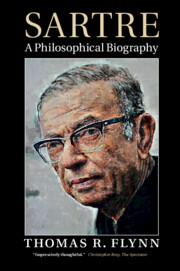Book contents
- Frontmatter
- Dedication
- Contents
- Preface
- Acknowledgments
- Abbreviations
- 1 The childhood of a genius
- 2 An elite education: student, author, soldier, teacher
- 3 Teaching in the lycée, 1931–1939
- 4 First triumph: The Imagination
- 5 Consciousness as imagination
- 6 The necessity of contingency: Nausea
- 7 The war years, 1939–1944
- 8 Bad faith in human life: Being and Nothingness
- 9 Existentialism: the fruit of liberation
- 10 Ends and means: existential ethics
- 11 Means and ends: political existentialism
- 12 A theory of history: Search for a Method
- 13 Individuals and groups: Critique of Dialectical Reason
- 14 A second ethics?
- 15 Existential biography: Flaubert and others
- Conclusion: the Sartrean imaginary, chastened but indomitable
- Select bibliography
- Index
- References
3 - Teaching in the lycée, 1931–1939
Published online by Cambridge University Press: 18 December 2014
- Frontmatter
- Dedication
- Contents
- Preface
- Acknowledgments
- Abbreviations
- 1 The childhood of a genius
- 2 An elite education: student, author, soldier, teacher
- 3 Teaching in the lycée, 1931–1939
- 4 First triumph: The Imagination
- 5 Consciousness as imagination
- 6 The necessity of contingency: Nausea
- 7 The war years, 1939–1944
- 8 Bad faith in human life: Being and Nothingness
- 9 Existentialism: the fruit of liberation
- 10 Ends and means: existential ethics
- 11 Means and ends: political existentialism
- 12 A theory of history: Search for a Method
- 13 Individuals and groups: Critique of Dialectical Reason
- 14 A second ethics?
- 15 Existential biography: Flaubert and others
- Conclusion: the Sartrean imaginary, chastened but indomitable
- Select bibliography
- Index
- References
Summary
From the time he left the army to replace an ailing instructor in the lycée at Le Havre till September 2, 1939, when he was recalled to active duty during the “phoney war” of 1939–1940, Sartre made his living as a high-school teacher, first in Le Havre, then in Laon, and finally at the Lycée Pasteur in the Parisian suburb of Neuilly. His reputation in the early years was that of a student-friendly, lax disciplinarian who didn’t wear the usual necktie, who would invite interested pupils and two or three colleagues to share in amateur boxing practice (he used to box while at the École), and so it was reported, would even join some of the older students in visiting a local bordello. But his students’ most memorable impression was of a brilliant mind, anxious to get them to think for themselves as he had done to his own detriment on the first agrégation exam, rather than merely to “play the game” that had won him victory in the second. One of these students and fellow pugilists, Jacques Laurent Bost, would become a member of Sartre and Beauvoir’s “family,” their inner circle of close friends.
Sartre was nothing if not unorthodox. Asked to deliver the lecture for the prize day at the close of his first term in Le Havre, on July 12, 1931, he eschewed the standard praises of a liberal education in favor of an exciting but shocking disquisition on the cinema as a liberal art. This was not what the teachers or parents had expected, since the movies were commonly regarded as frivolous entertainment rather than as a genuine art form. But Sartre had something of importance to say on a subject that had fascinated him since childhood, and he said it.
- Type
- Chapter
- Information
- SartreA Philosophical Biography, pp. 47 - 75Publisher: Cambridge University PressPrint publication year: 2014



